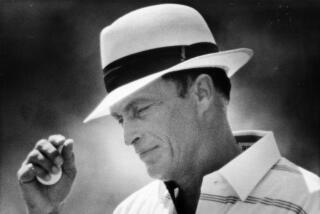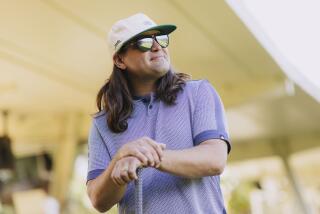For the Duffer or O’Grady, Lee Has the Answers : Trevino Offers Advice for Everyone
- Share via
If there is a golfer on the PGA Tour that iconoclast Mac O’Grady can relate to, it should be Lee Trevino. Both beat around the fringes of the game, struggling from day to day to scratch enough pennies to get themselves a tee time until their 30s. Both were 32 before they joined the Tour.
So, if O’Grady wants some advice on how to handle the six-week suspension and $5,000 fine given this week by Tour Commissioner Deane Beman, Trevino has it:
“I’d tell him, ‘You’re a hero right now, Mac. You just won a tournament, you’re sitting on top of the world. You can afford to swallow your pride and take your medicine, even if you don’t think it’s called for. Take it like a man and get on with what you do best--striking the golf ball.’ ”
Trevino, 46, was in Long Beach to conduct a Learn With Lee clinic Tuesday for one of his sponsors. He had just flown in from Hartford, Conn., where Saturday he was paired with O’Grady, 35, in the third round of the Sammy Davis Jr. Greater Hartford Open--which O’Grady won Sunday in a playoff with Roger Maltbie after shooting a course-record 62. It was O’Grady’s first tournament win and he collected $126,000.
“If he decides to keep on fighting the commissioner, and I’m afraid that’s what he’s going to do,” Trevino said, “he’ll be painting himself into a corner. Every once in a while, you’ve got to listen to the advice of someone you respect. I know. That happened to me when I said, and I meant it, that I’d never play at Augusta (in the Masters) again.”
In 1969, after playing at Augusta National, Trevino said he would never return because the famous Masters course was not suited for his left-to-right, low-trajectory type of play.
“If a great man hadn’t come to me and told me I was making a mistake, I probably would never have gone back. Jack Nicklaus sat me down in a locker room and I told him, ‘No, I’ll never go there again.’ He said, ‘Lee, I know your problems with the course, and I know you think you’re right, but the Masters is a great golf tournament, it’s a great thing for golf. People watch that tournament who don’t watch any other. Some of those people become supporters of the game. If you don’t go back, you’re not only hurting yourself, you’re hurting all the others who have supported the game.’ I went back and I’ve been going back every year.”
O’Grady was fined and suspended for “conduct unbecoming a professional golfer” by Beman, and an appeal was rejected by a three-man appeals committee.
“I knew they would,” Trevino said when informed of the action. “But I want to talk to that young man again. I’ve known Mac for 20 years, probably longer than nearly anyone out there (PGA Tour), and I don’t want him to make a mistake when he can come out of this a hero.
“Last Saturday, right during the round, we started talking about Seve (Ballesteros) and why he got suspended for refusing to play in a required number of tour events (during the 1985 season). Mac said Seve was right and he kept saying that this is a free society and a player is self-employed so he ought to be able to do what he pleases.
“I tried to explain to him what it would have meant if Jack Nicklaus and Arnold Palmer and Raymond Floyd and Tom Watson and myself had had that attitude a few years ago and played only when we pleased. If sponsors put up a lot of money and the players that people wanted to see didn’t come to play, pretty soon there wouldn’t be any sponsors and young men like Mac O’Grady wouldn’t be out here playing for $700,000. You’ve got to have some control to keep the sponsors satisfied.
“ ‘You, of all people,’ I told him, ‘should appreciate that. It took you 17 times (in the PGA qualifying school) to get out here. Why did you try so hard if you wanted to come out here now and tip the boat? You ought to appreciate what you’ve got.’
“I told him this might be a free society, but there has to be some rules. I asked him if he thought he should be able to go 100 miles an hour through town, or get drunk and drive, or not pay his income taxes. I told him this might be a free society, but if he did any of those things he’d find himself in jail, and that’s a hell of a lot worse than a fine and six weeks off.
“I just hope he’ll listen to me. I might not be a great man in his eyes, and he might not look up to me like I did to Nicklaus, but I’ve been around enough to know what’s best for me and what’s best for the game of golf, and it’s the same for Mac O’Grady. I know what’s bugging him, because I had the same problems once, but I paid up.”
O’Grady’s problems began two years ago, when he allegedly insulted a tournament worker in New Orleans. When he refused to pay a fine, Beman withdrew the sum from his earnings at the next tournament, triggering a running feud between the Palm Springs professional and the commissioner. O’Grady continued to criticize Beman, and later added fellow professional Jim Colbert and the condition of the Riviera Country Club to his fury.
In 1974, Trevino was fined for “unprofessional conduct” during a tournament in Melbourne, Australia, during which he criticized Australian PGA president Peter Thomson and the Royal Melbourne course, where the tournament was played.
“Royal Melbourne’s greens are the biggest joke since Watergate,” Trevino told the Australian press. A month later he paid a $500 fine in Australian money, approximately $690 in U.S. currency at the time.
Ironically, it was Riviera’s greens that drew O’Grady’s ire last February. He said putting on them was “like putting down a cobblestone road.”
Steve Novak, a San Diego attorney who represents O’Grady, said that they may file a complaint in federal court to block Beman’s action. The suspension is not due to start until next week, which will allow O’Grady to play in this week’s Anheuser-Busch tournament in Williamsburg, Va.
The way O’Grady has his schedule planned, he would actually miss only one or two Tour events in the six-week penalty period. Next week, the first of the suspension, he plans to play in the British Open, a tournament not affected by Beman’s edict. Then he will take two weeks off and come back for the PGA, the International at Castle Pines, Colo., and the World Series of Golf at Akron, Ohio.
O’Grady would be eligible for the PGA and the World Series, a Tour spokesman said, so he would only actually miss the International, a new invitational event on the Tour for the first time.
“The way it’s set up, Mac would be making a terrible mistake to go any further with his beef against the commissioner,” Trevino said.
A doping scandal, such as those which have hit other professional sports recently, is unlikely in golf, Trevino believes, because of their upbringing in the sport.
“I wouldn’t say 100% of the players don’t try it (dope), or haven’t tried it, but golf is an individual sport and I don’t think it’s the place for it. No, I don’t think you’ll hear anything like that in golf. Golfers are self-motivated, and have a built-in self-discipline that goes against anything like that.
“Kids growing up in team sports don’t have that kind of discipline because they haven’t needed it. From the time they’re in junior high school, they’ve been romanced, taken care of, told when to eat, what to eat, when to go to bed, when to get up. Someone takes them to the game, then takes them home. Everything they do is planned by someone else, so they have no concern except to play their game.
“A basketball player lives like this for 10, maybe 12 years, and then he’s suddenly handed a million bucks bonus and turned loose in the world. What do they expect him to do? It’s the first time he’s been on his own, and he’s rich. But he’s a babe in the woods.
“Golfers are better educated. I don’t mean college-educated, for damn sure I don’t mean that, but I mean educated in how to fend for themselves. They’ve pretty much been on their own from the time they started playing. They don’t stand out on the range banging balls for hours at a time just because a coach says to. They do it because they want to do it. And when they turn professional, no one hands them a million-dollar bonus. They have to go out and play for it.”
Trevino will not play this week at Williamsburg, but he will be there for an NBC-TV commitment in what he calls his “second career.”
This year he has played in nine tournaments, his best being a tie for fourth in the U.S. Open at Shinnecock Hills after being tied for the lead on the final day before Raymond Floyd broke out of a 10-player deadlock to win.
He also does clinics for sponsors, “about 10 to 15, maybe 20 sometimes, a year,” between playing and announcing.
“I love to do these clinics,” he said, slipping on his traditional red shirt for the occasion. “But I’ve never come this far to do one. I was in Connecticut yesterday and I’ll be in Virginia Thursday.”
With that, he picked up a wedge, walked in front of a portable grandstand at the El Dorado course in Long Beach and took a few practice swings as the thousand or so fans cheered his appearance.
“Hey, you can’t help but love this,” he said. “I’m center-stage here. There’s not one person in the crowd who was pulled in here against their own will. They’re all here to listen to Lee. That’s why I don’t mind coming this far to do this.”
More to Read
Go beyond the scoreboard
Get the latest on L.A.'s teams in the daily Sports Report newsletter.
You may occasionally receive promotional content from the Los Angeles Times.










